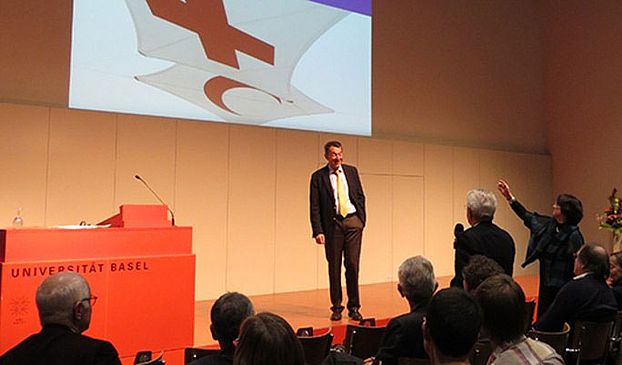/ Events
Public Lecture by ICRC President Peter Maurer

Peter Maurer, President of the International Committee of the Red Cross (ICRC), presented a public lecture on the topic “Global Networks to Solve Local Problems – the Example of the ICRC”. The lecture was given on November 17, 2014, at 6pm at the Kollegienhaus of the University of Basel. It was organized by the Institute for European Global Studies.
In what ways can global networks help to solve local problems? Peter Maurer, President of the International Committee of the Red Cross, used the example of his own organization to address this question in the public lecture “Globale Netzwerke, locale Problemlösungen – das Beispiel des IKRK”. During the 150 years that have passed since of the ICRC was established, the conditions for humanitarian work have radically changed. As a result of military innovation, political fluctuations, and international cooperations, conflicts and humanitarian aid have become increasingly influenced by global networks. As an independent and neutral international organization, the ICRC is in itself part of this global networking process.
Peter Maurer took office as president of the ICRC in July 2012. In this position, he bears primary responsibility for the ICRC’s external relations and humanitarian diplomacy. He regularly visits the organization’s operations in regions of conflict, and represents the ICRC at international conferences and organizations working on humanitarian issues. Before his ICRC presidency, Maurer was ambassador and permanent representative of Switzerland to the United Nations in New York from 2004 to 2010, where he worked towards integrating Switzerland, which had only recently joined the United Nations, into multilateral networks. In January 2010 he was appointed secretary of State for foreign affairs in Bern.
The foundation of the International Committee of the Red Cross (ICRC) marked the beginning of the Red Cross and Red Crescent Movement. The ICRC is one of the few original non-governmental subjects of Public International Law. Its exclusively humanitarian mission is based on the principles of impartiality, neutrality and independence, and aims to protect the lives and dignity of victims of war and internal violence and to provide them with assistance.
In May 2014, the ICRC and the University of Basel signed an agreement to strengthen the scientific cooperation of the two institutions in the fields of historic research and humanitarian action. The new cooperation facilitates the work of researchers from the University of Basel by granting them easier access to the ICRC’s archives. In reverse, the university points its students and academic partners to the rich resources, libraries and research tools of the ICRC. The Institute for European Global Studies and the ICRC’s Division of Archives and Information Management will work towards the realization of the agreements’ aims.
